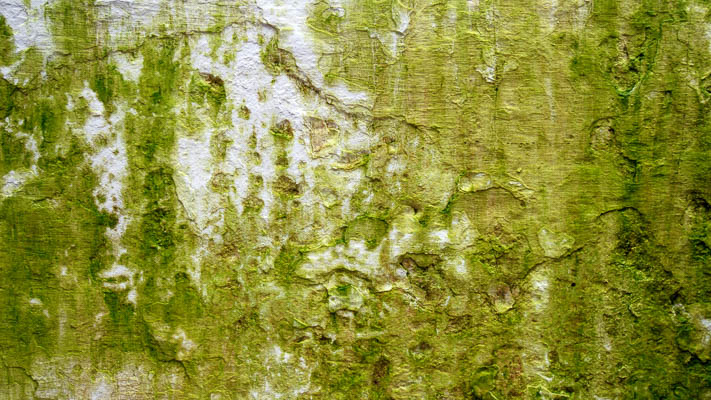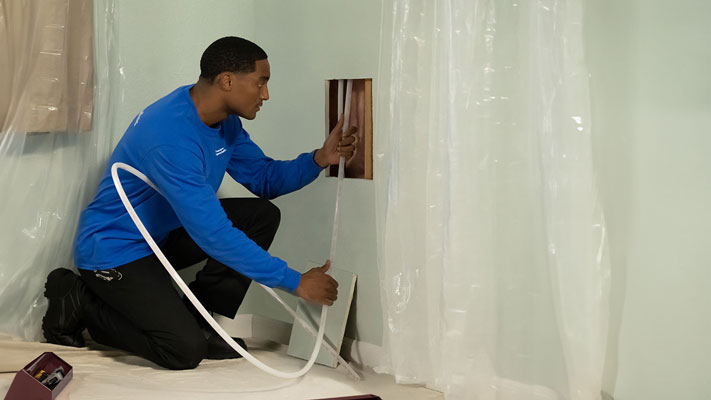What Causes Black Mold in Homes?
Black mold thrives in areas with high moisture levels and organic materials. While mold spores are present almost everywhere in the air, they only begin to grow when the right conditions are met. This is especially common in warm and damp places.
Four of the most common causes of black mold growth in homes include:
- Undetected pipe leaks: Leaks under slabs and floors, inside walls, or in ceilings can persist for weeks or months before becoming visible, providing an ideal environment for black mold.
- Poor ventilation: Bathrooms, laundry rooms, and kitchens with limited airflow tend to trap moisture, increasing the likelihood of mold growth.
- Flood damage or water intrusion: Whether it's a burst pipe or heavy rain seeping through a roof or foundation, water that isn't properly dried out can trigger mold within 24 to 48 hours.
- Old or corroding pipes: In older homes, outdated piping materials like galvanized steel or polybutylene pipes are more prone to leaks, which often go unnoticed until black mold or water damage appears.
In short, moisture is the key factor. Wherever water collects or leaks—even in small amounts—there's potential for black mold to take hold.
Common Signs of Black Mold Growth
Because black mold often grows in hidden places, spotting it early can be difficult. But there are several signs to watch for that may indicate its presence:
- Musty or earthy odor: This is often the first clue, especially in areas like basements, attics, or behind cupboards where moisture collects.
- Dark patches or spots: Black mold tends to appear as slimy or fuzzy dark green, black, or gray patches. It often starts small but can quickly spread if left untreated.
- Peeling or bubbling paint or wallpaper: Moisture behind walls can loosen adhesive, causing visible surface damage.
- Increased allergy symptoms or respiratory issues: If you or your family experience worsening sneezing, coughing, itchy eyes, or shortness of breath at home, mold could be a contributing factor.

If you notice any of these signs—especially in areas where water damage has occurred—it's important to act quickly. Mold remediation becomes more complicated and costly the longer it's allowed to spread.
For more common signs, you can read about how to identify mold growth from a water leak in your home.
Can Outdated Plumbing Cause Black Mold to Grow?
Water damage is one of the most common causes of black mold in homes. Whether caused by a burst pipe, appliance failure, roof leak, or plumbing issue, any event that introduces moisture into your home's structure can create a breeding ground for mold.
The danger often lies in how water damage is handled. If surfaces like drywall, flooring, or insulation are not dried thoroughly and promptly, lingering moisture can allow mold spores to take root. Even slow leaks from worn or damaged pipes can lead to hidden mold problems behind walls or under floors.
Importantly, modern homes often feature layers of insulation and sealed wall cavities, which can trap moisture in enclosed areas—making it even harder to detect mold until it becomes a serious issue. If your plumbing system is old, damaged, or prone to leaks, updating it can significantly reduce the risk of recurring water damage and mold.
While we don't perform mold remediation, there's a high likelihood that black mold is being caused by issues such as leaky and outdated pipes—which we specialize in replacing.
Get your free estimate today
With over 75,000 repipes completed, we've perfected our One-Stop Repipe™ for your home.
How To Get Rid of Black Mold Caused By Water Leaks
Removing black mold requires more than just surface cleaning. Mold remediation typically involves:
- Stopping the source of moisture: This means repairing the water leak or repiping the affected area if the plumbing is compromised. Until the underlying moisture issue is resolved, mold will keep coming back.
- Removing contaminated materials: Porous materials like drywall or carpet often need to be removed completely if they've been saturated. Black mold can grow deep within these materials and is difficult to fully eliminate otherwise.
- Cleaning and sanitizing affected areas: Professional-grade antimicrobial treatments may be used to kill mold spores and prevent regrowth on non-porous surfaces like tile or concrete.
- Drying the space thoroughly: Dehumidifiers and proper ventilation are essential during and after cleanup to ensure the area remains dry.
- Repiping outdated materials: In cases where water leaks are caused by aging or corroded pipes, repiping may be a crucial step in preventing future mold problems. Outdated plumbing materials such as galvanized steel, polybutylene, or aging copper pipes are prone to cracking, leaking, and hidden failures, allowing moisture to seep into walls or floors. Replacing these materials with modern options like PEX or new copper lines not only resolves current issues but adds long-term protection against water damage and mold recurrence.

If black mold keeps returning despite your best cleanup efforts, or if you've had repeated leaks in different parts of the home, it may be time to consider repiping as part of your black mold prevention strategy.
Get a Free Quote for Whole-House Repiping
Here at Repipe Specialists, we've permanently fixed outdated pipes that were causing black mold in thousands of homes by repiping them with PEX tubing. We consistently receive positive feedback from customers about their overall home repipe experiences and often exceed their expectations in the following areas:
- Speed: Our repipe crews typically complete a repipe in a day, returning on another day for wall patching.
- Convenience: Through our One-Stop Repipe™ Process, we handle everything from permits, to wall patching, to inspections.
- Cleanliness: Our crews are trained to protect your home while working (we cover all surfaces with protective sheeting), and to clean up fully at the end of each day.
- Peace of Mind: Repipe Specialists is a fully licensed plumber in every state we operate in, and we back all of our repipes with a lifetime warranty.
- Financing programs: To help take the sting out of unplanned repipe expenses, we offer several financing programs.
- Price: As a specialist that performs hundreds of repipes a week, we can deliver high quality repipes at a lower cost vs generalist plumbers. Our quotes typically range from $4,500 to $15,000 depending on the size and complexity of your project. We have an article that covers repipe cost factors in detail.
Schedule a free in-home consult, and one of our local repipe consultants will explain all your repipe options and provide you with a written, fixed-price quote. Beat black mold, repipe your leaky pipes now.

